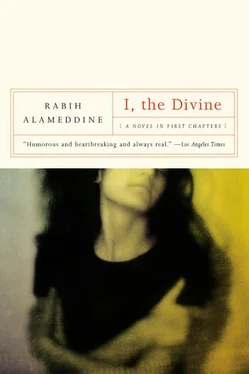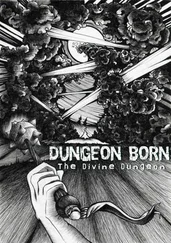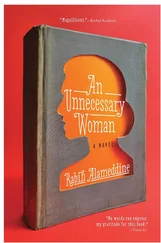We can’t hear much of their conversation yet; the sound of running water overpowers everything. Let us try and move closer so we can eavesdrop. We begin to hear a conversation already in progress. The hyacinth woman says, “His hair was still soldered with brilliantine. It was still black-black. I couldn’t believe it. My mother actually dyed the hair of the corpse and then used a ton of brilliantine like she did every morning while he was still alive. I walk into the room and the bastard looks like he’s twenty years younger except he doesn’t look anything like himself, all sallow and pallid. My mother had him lying on the bed, his head on the pillow, his arms folded on his chest, exactly like he looked all the time when he was resting and I wasn’t allowed to disturb him. It was right out of the Twilight Zone . Kept waiting to hear the music in the background. So here I am, just arrived, everybody berating me for being late as if I could have taken the Concorde to Beirut or something, and my mother takes me in to see him and he looks like he’s been waiting for me. It was sick. My mother says I can touch him if I want. Well, the only thing I wanted to touch was his hair. I don’t know what came over me. I wanted to muss up his hair.”
“Actually,” the red-haired woman says, “I’ve always wanted to do that myself. Not sure why.”
“Me too. But I couldn’t do it while he was alive and now here he lay dead in front of me. So I tried and you know what? I couldn’t do it. That damn brilliantine was so stuck it felt like I was trying to break up cement. It remained like a bowling ball. All I did was break his hair into compact strips, but it sure didn’t move. Even at the end he frustrates me. Too bad he’s dead because he could have explained all this to me.”
“Brilliantine is never just brilliantine.”
“No,” the hyacinth woman says with a giggle, “nothing is ever just what it is.” She smiles for the first time. Her companion joins her in smiling, happy to be of some use. Hyacinth woman puts her arm through her friend’s, moves closer and lays her head on her friend’s shoulder.
Now, what can we gather from this glimpse into these two women’s lives? We have a slightly clearer picture. First, let us name them, for we cannot keep calling them the hyacinth and the red-haired woman. The former we shall call Dina and the latter, Sarah, good Lebanese names. It is fairly obvious from the snippet of conversation we overheard that Dina has just attended her father’s funeral, which must have happened in Beirut. It seems Sarah is here to comfort her. We can tell from the last physical interaction, the laying of the head on the other’s shoulder, that they are close, probably old friends. What else? Well, they spoke without much of a discernible accent — discernible foreign accent, that is. That means they have probably been living in America for a while, probably arrived at a fairly young age, not children, but young adults. Dina does seem to have a noticeable Boston twang to her words, so maybe Snowplow John, with his quick assessment, was not far off after all.
Dina delivered her speech impassively, not removing her gaze from the waters until the end. Her face is heavily made up, even the purple eye shadow applied with thought to match the outfit. Whatever is troubling her is not apparent to the inexperienced eye. She seems serene, content with her life. Yet Sarah’s face shows a concern for her friend that eases slightly only when Dina smiles.
Let us find out more.
Sarah walks over to the stone bench and sits down. She seems slightly more at ease, but not much. She takes off the cap, scratches her head, and puts the cap back on. “I should have been there,” she says. “You should have let me come.”
“No. I was fine. It wouldn’t have mattered.”
“It would have. I should’ve been there for you.”
“Oh, come on,” Dina says, still somewhat impassively. “My mother would have had a conniption. She would’ve been on me the whole time. If you wanted to help me, your not coming was a great help.”
“Hey, thanks.”
“You know what I mean. My mother still thinks you turned me into a lesbian. She hates your guts. You ruined me, admit it. You led me down this road of sin and left me there. It’s your fault I’m a fallen woman.”
“If only I could talk to your mother. Listen, can’t I just talk to her? Next time I’m in Beirut, I can just go over and talk to her.”
Dina sits down next to her friend. “Get real,” she says seriously. “Do you think you’d be able to get through to her? Do you think you can say anything I haven’t? She remembers what you were like. We slept together in the same bed many times. Ergo, you’re the lesbian and you converted me. It’s simple.”
“Your mother’s fucked up.”
Dina smacks the back of Sarah’s head playfully. “Earth to Sarah. What do you think I’ve been saying all these years?”
“I should’ve been there. For you.”
“It was almost as if you were there. Your whole family showed up. All of them. That was so wonderful. Even your ex-husband was there with your son. I was so grateful. I think we should plan on getting you two remarried.”
“And his wife?”
“Details, details. We can easily get rid of that little ninny.”
“Kidnap her and force her to wear something other than Armani. That’ll kill her on the spot, don’t you think?”
“He still loves you dearly.”
“I know. And I love him. It just didn’t work out, that’s all. We still talk three or four times a week. Sometimes I wonder what could have been, but it never would have worked out. We always wanted different things. In a way, we’re closer now than we’ve ever been. We have no need to change each other.”
“We still should get rid of that little ninny.”
“And get him a better haircut.”
“And make him stop smoking.”
“And get him out of politics.”
Sarah and Dina have their arms entangled again. Sitting on the bench, Sarah looks quizzically at her friend, still wonders if Dina remains troubled. A questioning expression keeps reappearing on Sarah’s face.
“Your father was there. I was surprised. He offered me his condolences. Surprised the hell out of me.”
“It shouldn’t have. He’s a stickler for rituals. He was just doing his duty.”
“He still hates my guts.”
“Yours hated mine.”
“Your mother was wonderful.”
“My stepmother?”
“Yes. She’s extraordinary. I love that woman.”
“She always loved you. From the beginning.”
“She took me out to lunch a couple of times. It seems every time I see her, I gain more respect for her. Do you realize she’s the only one who asks how Margot is doing? For everyone else the relationship doesn’t exist. Twenty years together and my mother doesn’t want to know anything, but your mother cares enough to ask. Maybe she should adopt me.”
“If she did, you’d be set financially.”
“Yeah, and who would’ve believed that?”
The women have been sitting silent for a while. Sarah wants to interrupt the interlude, but is unsure how to proceed. She is examining Dina’s face in an attempt to read the secrets hidden there. She finally breaks in: “Why are we here?”
“I wanted to be out of Boston,” Dina answers.
“Yes, but why here? Why didn’t you just visit me in San Francisco?”
“I didn’t want to be that far out of Boston!”
“Why not New York?”
“I like it here. Always have. I can think here. It’s so beautiful.”
We can see Sarah is not fully satisfied with the answers. She hesitates, trying to figure out the best way in. “Are you worried about work?”
“Work? No. I took a leave of absence from the firm. I can come back whenever I feel ready. They’ve been quite supportive. Speaking of work, I designed a cabin in the woods about two miles north of here. We should go up and visit. You can see what my early work looks like.”
Читать дальше












